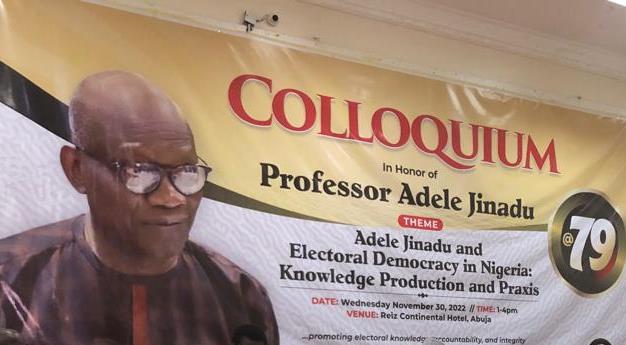By Prof Adele Jinadu
Pat and I, our children, Mustapha and Rasheedat, their children, Mehmet, Amirah and Sarina, and the extended Jinadu Family thank you all for honouring the invitation to this Colloquium.
(2). For me, the Colloquium is a testimonial not to me but to the value of intellectual networking directed towards fusing intellectual work, knowledge production with applied public policy in the finest humanistic tradition of the intellectual vocation, as also advocacy and social action for the public interest.
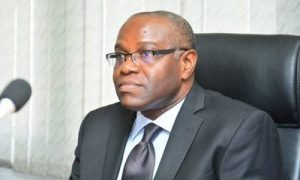
Prof Okey Ibeanu
(3). I extend special words of appreciation to Okey Ibeanu for his behind-the-scene but pivotal role in putting forward and realizing the idea behind the Colloquium. But no less heartfelt appreciation is due and is extended to our Chairman Mao, Kole Shettima, our Fish Farm Chief Curator, Jibrin Ibrahim, other Curators of the Fish Farm, John Odah, Y. Z Y’au, and to our indefatigable Princess, our Fish Farm Treasurer, for their labour in joining Okey to put all this together in less than a week.
(4). I apologize to my fellow old-guards, who have been part of my intellectual peregrinations over the past fifty to 65 years, close family friends, indeed family members, through thick and think. I share with them memorable, though not nostalgic but exciting, typically rascally, sometimes rumbustious moments, which I cannot recount here, because the neophytes, the under 70s cannot imagine what we were up to in those olden days, when “boys were boys and girls were girls, and both loved it!”
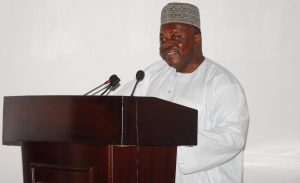
Prof Jibrin Ibrahim
(5). I hope to join them next year, by the Grace of Allah, when they welcome me to the diminishing Octogenarian Family of still robustly and engagingly active Nigerian Public Intellectuals, who persist in speaking the truth to power, from the heart and without the type of dissimulation and dishonesty which our good brother and friend of blessed memory, Claude Ake described as “defensive radicalism.”
(6). As part of the ceremony marking my 80th birthday anniversary, and with the Grace of Allah, I plan to make a public presentation of a major study of the Federal Idea in Nigeria, which is about three-quarters completed. As I told Jibo at the Fish Farm last night, I hope to send the uncompleted draft to some of our colleagues by the end of January 2023, followed by a two-day Retreat where the draft can be peer reviewed by those to whom I would have sent it.

Prof Attahiru Jega
(7). Apologies are amply due to them, because the Colloquium is also a testimony to their unrelenting pursuit of knowledge production as a particular type of praxis—a collective-liberating one to make the world better. I apologize for my ambushing them to be part of this Colloquium. I refer to Bolaji Akinyemi (My Man), Okwudiba Nnoli (a.k.a. Knock Down You), Sam Oyovbaire (a.k.a. Dr. Sam), Tunji Olagunju (a.k.a. Eku se, Well Done), Dipo Adamolekun (My Oga Dipo) and to Tunde Adeniran (Oni dodo of Dodo), perhaps the youngest among those of us on the verge of turning 80!
(8). They would have liked to play a larger role with a prominent feature and physical presence on the Colloquium. My only excuse is that I was myself ambushed into it, when it was clear to Okey Ibeanu last Wednesday, November 16, 2022, that he could not entice me, the Proud but cosmopolitan Lagos Boy that I always will be, to extend my visit to Abuja to today—a realization which made him to recruit me to become part of the conspiracy to hold a surprise Colloquium, instead of the usual 30 November birthday celebration for the four of us who share the same birthday Okey, Jibo, Hauwa and myself, as was the practice some years ago. I thank these old but vintage boys for virtually or physically being part of this Colloquium.

Prof Bolaji Akinyemi
(9). Let me say a few words about the theme of the Colloquium. John Odah and Alaba Ogunsanwo, another Octogenerian public intellectual and family friend, drew my attention to a piece, entitled “A Reflective Birthday Session for Professor Adele Jinadu @79”,´ in the online publication, “Intervention.”
(10). The author observes as follows: “The choice (of the title of the Colloquium ) must have been based on his (Jinadu’s) time with the electoral process in Nigeria but he was not a scholar of elections or of the war variant we call elections in Nigeria…but, for someone such as Jinadu, his Ph.D topic could have been a better source of what specific item to isolate, especially now that the philosopher he looked at for his work has increased in stature from a Philosopher to a seer of the ‘African condition.’”
(11). I think the author misses the point of the title and the objective of the Colloquium in two respects. First, the author conflates elections or “the electoral process” with electoral democracy. Secondly, the author overlooks the theory-praxis nexus highlighted in the Colloquium’s sub-title, Knowledge Production and Praxis. Let me elaborate briefly on these two points.
 (12). My own work in political theory converged with those of members of a radically progressive network of Afrocentric African and Africanist scholars, under the auspices of the African Association of Political Science, the Council for the Development of Social Science Research in Africa (CODESRIA) and the Economic Commission for Africa (ECA) between the mid-1970s and 1980s, who were influenced by or whose perspectives on African politics and the character of the African State bore strong affinities with the writings of Cabral, Fanon, Nkrumah, Nyerere, and Mondlane on the social responsibility of the African intellectual to redefine inherited, liberal and Marxist, expatriate notions of democracy and development along indigenized but social democratic lines to promote people-centered human development in the African State.
(12). My own work in political theory converged with those of members of a radically progressive network of Afrocentric African and Africanist scholars, under the auspices of the African Association of Political Science, the Council for the Development of Social Science Research in Africa (CODESRIA) and the Economic Commission for Africa (ECA) between the mid-1970s and 1980s, who were influenced by or whose perspectives on African politics and the character of the African State bore strong affinities with the writings of Cabral, Fanon, Nkrumah, Nyerere, and Mondlane on the social responsibility of the African intellectual to redefine inherited, liberal and Marxist, expatriate notions of democracy and development along indigenized but social democratic lines to promote people-centered human development in the African State.
(13). The message and the symbolism of this Colloquium must be the imperative for our intellectuals, middle and professional classes and the civil society to reclaim and reinvent the democratic impulses that found expression in knowledge production about democracy and development by Afrocentric African and progressive expatriate Africanist scholars at various intellectual sites in Africa.
(14). This imperative was remarkably exemplified, although from different intellectual lenses, in the intellectual work of Ladipo Adamolekun, Samir Amin, Claude Ake, Bolaji Akinyemi, Emmanuel Hansen, Archie Mafeje, Mahmood Mamdani, Thandika Mkandawire, Dani Nabudere, Okwudiba Nnoli, and Issa Shivji, and in the work of a younger but, lamentably, diminishing network of younger Nigerian scholars such as Adekeye Adebajo, Victor Adetula, Tade Aina, Shina Alli, Jibrin Ibrahim, Attahiru Jega, Bayo Ninalowo, and Bayo Olukoshi.
(15). It is an imperative and a reinvention that must urgently be pursued with intense vigour if we are to advance “the feasibility” of democracy and take bold action to unlock the heavy fetters placed on democracy and development by our political class, the country’s party system, and the frightening loss of direction in our pro-democracy civil society organizations.
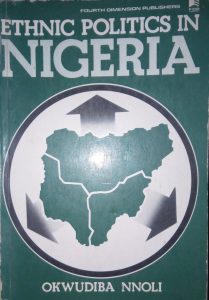 (16). There are worrisome signs, particularly within the civil society, of a growing vicious attempt to discredit the leadership of INEC in a manner to bring about the reversals of advances towards the routinization of electoral democracy in the country, made under Attahiru Jega and now under Mahmood Yakubu.
(16). There are worrisome signs, particularly within the civil society, of a growing vicious attempt to discredit the leadership of INEC in a manner to bring about the reversals of advances towards the routinization of electoral democracy in the country, made under Attahiru Jega and now under Mahmood Yakubu.
(17). Following upon this observation, I want to end on the following note:
(18). It symbolizes our enduring hope in combining theory and praxis in navigating the tortuous knowledge production and praxis nexus skillfully, as mechanisms for nurturing and sustaining democracy and development in our country that Attahiru Jega is the chairman of this Colloquium. It was under his visionary but strategically proactive leadership that INEC was reinvented through internal administrative and financial reform and the deployment of technology to sanitize our electoral process. Anti-democracy forces in state and society are now poised and determined to roll the gains from that reinvention.
(19). What needs emphasis, however, is the heavy intellectual capital invested in the reform, in the form of knowledge production and its applied policy utilization. We are lucky to have 5 of us here today who served on, or worked with the 2007/2008 Electoral Reform Committee, whose recommendations, in a fundamental sense, presaged some of the daring reform carried out by INEC under the leadership of Attahiru Jega and Mahmood Yakubu since 2015. These colleagues here with us at this Colloquium are Bolaji Akinyemi, Jibrin Ibrahim, and Attahiru Jega, as members, and Okey Ibeanu and me, as consultants to the Electoral Reform Committee.
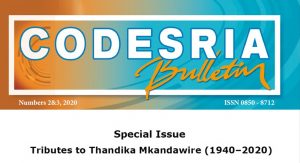 (20). In a society, where intellectual work has been sacrificed on the altar of crass materialism and philistinism, and with it the commodization of the intellectual vocation, we must reaffirm our faith in and commit ourselves as an expression of our social responsibility to the transformative power of knowledge production as a force for electoral democracy and development in our country.
(20). In a society, where intellectual work has been sacrificed on the altar of crass materialism and philistinism, and with it the commodization of the intellectual vocation, we must reaffirm our faith in and commit ourselves as an expression of our social responsibility to the transformative power of knowledge production as a force for electoral democracy and development in our country.
(21). Pro-democracy stakeholders in state and society must devote, now more than ever, more proactive energy to resist on-going attempts by anti-democracy forces in state and society in and outside our country, to derail the electoral process by launching a coordinated attack on INEC.
(22). It must be realized that INEC is not the enemy of democracy but those who are afraid of INEC’s daring attempt to routinize electoral integrity as the core of our country’s electoral process and electoral governance and whom we must expose for their diversionary tactics to shift attention from their undemocratic, unpatriotic agenda.
(23). In other words, all of us, the octogenarians and near octogenarians, and the under 70s, the irrepressible “Young Turks” gathered here to celebrate the beauty of knowledge production as part of, and not separate from progressively-informed praxis, applied public policy must reject the incapacitation implied in “siddonlook” and embrace the following heroic uplifting message expressed through Ulysses by Alfred Lord Tennyson in his poem of the same title:
I cannot rest from travel; I will drink
Life to the lees. All times I have enjoyed
Greatly, have suffered greatly, both with those
That loved me, and alone; on shore, and when
Through scudding drifts the rainy Hyades
Vext the dim sea. I am become a name;
For always roaming with a hungry heart
Much have I seen and known—cities of men
And manners, climates, councils, governments,
Myself not least, but honored of them all,—
And drunk delight of battle with my peers,
Far on the ringing plains of windy Troy.
I am a part of all that I have met;
Yet all experience is an arch wherethrough
Gleams that untraveled world whose margin fades
Forever and for ever when I move.
How dull it is to pause, to make an end,
To rust unburnished, not to shine in use!
As though to breathe were life! Life piled on life
Were all too little, and of one to me
Little remains; but every hour is saved
From that eternal silence, something more,
A bringer of new things; and vile it were
For some three suns to store and hoard myself,
And this gray spirit yearning in desire
To follow knowledge like a sinking star,
Beyond the utmost bound of human thought.
………
There lies the port; the vessel puffs her sail;
There gloom the dark, broad seas. My mariners,
Souls that have toiled, and wrought, and thought with me,
That ever with a frolic welcome took
The thunder and the sunshine, and opposed
Free hearts, free foreheads—you and I are old;
Old age hath yet his honor and his toil.
Death closes all; but something ere the end,
Some work of noble note, may yet be done,
Not unbecoming men that strove with gods.
……………………………….Come, my friends,
‘Tis not too late to seek a newer world.
Push off, and sitting well in order smite
The sounding furrows; for my purpose holds
To sail beyond the sunset, and the baths
Of all the western stars, until I die.
It may be that the gulfs will wash us down;
It may be we shall touch the Happy Isles,
And see the great Achilles, whom we knew.
Though much is taken, much abides; and though
We are not now that strength which in old days
Moved earth and heaven, that which we are, we are,
One equal temper of heroic hearts,
Made weak by time and fate, but strong in will
To strive, to seek, to find, and not to yield.
Abuja, November 30th, 2022

